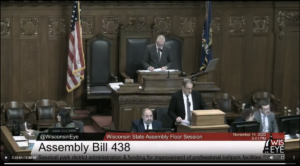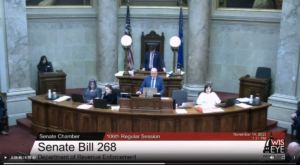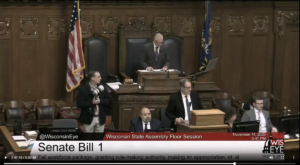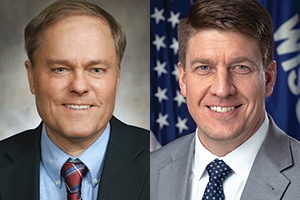
In this update:
- Legislative Updates
- Supreme Court Updates
- Administration Updates
Legislative Updates
Legislature passes bill to renovate Brewers stadium, Evers says he’ll sign

Governor Tony Evers (D) announced that he will sign the bipartisan plan to keep the Milwaukee Brewers in Wisconsin that was passed by the Wisconsin State Legislature this week. “This is a great day for Wisconsin. For decades, the Brewers have been a cherished part of our state’s heritage and an essential part of Milwaukee’s and our state’s economic success. And after months of hard work, I’m proud to say we’re going to be keeping the Brewers in Milwaukee, supporting thousands of family-supporting jobs—including union jobs—and ensuring a new generation of Wisconsinites can grow up cheering for the home team just like countless others before them,” said Gov. Evers. “As a lifelong Brewers fan, I always believed that we could work together to find common ground and build bipartisan support to keep this team and critical economic driver right here in Wisconsin, and today, that’s exactly what we did.”
AB 438 and AB 439 were approved 19-14 in the Senate and then sent to the Assembly where both passed 72-26. Prior to the floor vote, the bill had a $2 surcharge on tickets and an $8 surcharge for suites to non-Brewer events. The amended bill increases the tax by a dollar in 2033 and then another dollar in 2042 for both the tickets and suites. The amended ticket tax is estimated by the Legislative Fiscal Bureau to bring in $20.7 million through 2050 instead of the original $14.1 million. The increases to the ticket tax would then decrease the state’s contribution from $386.5 million to $365.8 million. Another amendment adds four more appointments to the stadium district board: one to the Senate Majority Leader, one to the Assembly Speaker, and two more to the governor that would be appointed by Milwaukee County and the city without Senate confirmation.
Legislature approves changes to state’s alcohol laws

The legislature approved changes to the state’s alcohol laws this week by using the amendment process to prevent the proposal from being held in committee. The Senate added an amendment that was over 150-pages to a bill that included tobacco and alcohol provisions under the Department of Revenue to push forward a plan to remodel the state’s system for producing, distributing, and selling alcohol. The amended bill, SB 268, passed in the Senate 19-14 and then was sent to the Assembly which approved the bill 88-10. The main point of contention in the bill was the added regulations on wedding barns and other private event spaces. The bill would require these spaces to obtain a license similar to taverns or obtain a no-sale event venue permit. A no-sale event venue permit would restrict these businesses from operating more than six days a year and allow only one event per month. Currently, these businesses do not need a permit for someone renting the space to supply alcohol. Opponents of the bill say the license needed to sell alcohol, a Class B license, is difficult to get which could cause wedding barns and similar private event spaces to go out of business.
The proposal to overhaul the state’s three-tier alcohol system was originally passed by the Assembly 90-4 in June and was referred to the Senate Committee on Universities and Revenue, chaired by Sen. Rob Hutton (R). However, the bill seemed to be languishing in committee, so Senate Majority Leader Devin LeMahieu (R), a cosponsor of the proposal, used a bipartisan coalition to move forward with a floor amendment on Tuesday, despite complaints from several GOP and Democratic Senators. Sen. Hutton opposed the floor amendment and said he was planning for the original bill to move to the floor when the legislature returned in January. He said amendments his committee was working on would have allowed a win-win for the alcohol industry and other parties involved. Meanwhile, Sen. LeMahieu dismissed further delays and said it “became real clear to me that stall tactics were being played and there was no intent to exec the bill.”
The Senate debate also had procedural tension. Senate President Chris Kapenga (R) ruled the amendment proposed by Sen. LeMahieu was non-germane since it was beyond the scope of the original bill. Sen. LeMahieu appealed Sen. Kapenga’s ruling, and in a rare move, the Senate overruled it 19-14. Sen. Kapenga also opposed the bill on final passage. Shortly after being passed in the Senate, the Assembly passed the bill 88-10. The measure now heads to Gov. Evers who can veto it or sign it into law.
Assembly passes $2.2 billion tax cut plan

A $2.2 billion tax cut plan was approved 62-36 to reintroduce a tax cut that was vetoed earlier this year that also included expanded tax breaks for childcare costs and private school tuition. All Republicans voted in favor of the bill except Rep. Scott Allen, who voted in opposition because of language on compact licensure included in the proposal. Democrats unanimously opposed the measure. Senate Special Session Bill 1 was originally a workforce development package proposed by Governor Tony Evers (D) that was subsequently amended and passed by Senate Republicans last month to include the tax reduction measures. The bill would reduce the individual income tax rate in the third highest bracket to 4.4% from 5.3%. The bill also includes a raise to the state income tax credit for those claiming the federal child and dependent care tax credit by increasing the employment-related expense limit. An increase to the deduction for having a child attend private school is also in the proposal.
Rep. Katrina Shankland (D) was critical of the GOP-amended bill, saying “What is missing from this bill is going to impact hundreds if not thousands of people related to childcare access, related to employers having workers, related to students having a spot at their local two-to-four-year university, and related to affordability of higher education.” Rep. Warren Petryk (R) argued in favor of the bills and said “despite the misguided and confusing rhetoric that we’ve heard on the other side of the aisle,” the bill would help more people get back to work, not hurt jobs. “Voting against this Senate amendment will in reality serves to harm those on unemployment assistance who are looking for work because they don’t get provided the statutory ability to get access to the services that they need to find their next career,” he said.
PFAS bill passes in the Senate
 The Senate passed 22-11 along party lines SB 312, a bill that aims to address PFAS contamination. The bill includes grant programs to eligible landowners and municipalities to help pay for PFAS-related testing, disposal, and infrastructure upgrades. The Senate added an amendment to the bill dropping a measure that would have prevented the Department of Natural Resources (DNR) from requiring a property owner to test for PFAS unless certain standards are met. The amendment was meant to address concerns from Democrats about limiting the DNR’s authority, however, Senate Democrats still unanimously opposed the measure.
The Senate passed 22-11 along party lines SB 312, a bill that aims to address PFAS contamination. The bill includes grant programs to eligible landowners and municipalities to help pay for PFAS-related testing, disposal, and infrastructure upgrades. The Senate added an amendment to the bill dropping a measure that would have prevented the Department of Natural Resources (DNR) from requiring a property owner to test for PFAS unless certain standards are met. The amendment was meant to address concerns from Democrats about limiting the DNR’s authority, however, Senate Democrats still unanimously opposed the measure.
Following the floor session, Senator Eric Wimberger (R) and Senator Rob Cowles (R) released a joint statement celebrating the bill’s passage. “Across Wisconsin, people, through no fault of their own, have property contaminated with PFAS and face financial ruin from devaluation and remediation orders,” they said. “People are currently forced with choosing between knowing their contamination levels for health or preserving their financial security.” The statement also said the bill is a step forward to further addressing the issue.
Senate Minority Leader Melissa Agard (D) disagreed with Sen. Wimberger and Sen. Cowles, and said the bill puts polluters before the people. “Legislation lacking in accountability for polluters and removing enforcement authority from the DNR, leaving our drinking water less safe and contaminating, affecting the most vulnerable in Wisconsin is not the Wisconsin way,” Sen. Agard said. Multiple environmental groups were also critical of the bill after the vote. Midwest Environmental Advocates (MEA) argued that the “innocent landowner” grant program would allow people polluting to qualify. MEA Staff Attorney Rob Lee said SB 312 “comes with too many strings attached and doesn’t do enough to prioritize private well owners.” Clean Wisconsin Government Affairs Director Erik Kanter said SB 312 is “too focused on protecting polluters and property values with too little concern for people and public health.”
Supreme Court Updates
Oral arguments scheduled for redistricting case
The Wisconsin Supreme Court scheduled oral arguments for the legislative redistricting case (Clarke v. Wisconsin Elections Commission) to be at 8:45 a.m. on Tuesday, November 21, 2023. The court is dividing the parties into two groups, with each side being given 80 minutes of oral argument time. The court also asked each group to submit a plan detailing how that group intends to divide the 80 minutes. WisconsinEye will be live streaming coverage on Tuesday: click here to watch.
The groups are as follows:
Group 1
- Members: Rebecca Clarke, et al.; Nathan Atkinson, et al.; Governor Tony Evers; and Senators Carpenter, Larson, Spreitzer, Hesselbein and Smith.
- Plan: click here
Group 2
- Members: the Wisconsin Legislature; Senators Cabral-Guevara, Hutton, Jacque, Jagler, James, Kapenga, LeMahieu, Marklein, Nass, Quinn, Tomczyk, and Wanggaard; and Johnson, et al.
- Plan: click here
Read the court order: click here
Evers administration and Vos oppose original jurisdiction in school choice lawsuit
Attorneys separately representing Assembly Speaker Robin Vos (R) and Department of Administration Secretary Kathy Blumenfeld urged the state Supreme Court to reject a lawsuit asking it to examine the constitutionality of the state’s school choice system. Both parties argued exceptional circumstances that would justify the court’s early intervention do not exist and instead, the lawsuit should make it’s way through lower courts first. While lawyers from the Department of Justice representing Sec. Blumenfeld pointed to the “factually intense nature” of the case and the “over 40 pages of assertions about school funding, the quality of private schools receiving vouchers, footnotes discussing the groups that sponsored these statutes, studies, and more,” lawyers representing Speaker Vos noted the school choice program had been enacted by the Legislature 33 years ago and the state Supreme Court upheld the program 31 years ago. A brief filed by Department of Public Instruction Superintendent Jill Underly took no position on the question of original jurisdiction.
Administration Updates
Gov. Evers takes action on three bills
 Governor Tony Evers (D) signed three bills into law this week. Two of the bills increase wages for certain public employees like State Patrol troopers and inspectors, as well as employees in the building trades crafts collective bargaining unit. The third bill exempts from payday loan regulation any transaction with no finance charge or fee. In a press release announcing the bill signing, Gov. Evers was critical of GOP legislators for failing to enact pay raises for UW-System employees that had been approved as part of the most recent state budget. “I am glad to be signing these two bills into law providing much-needed and well-deserved wage adjustments for our State Patrol and other folks in state service,” said Gov. Evers. “State employees are dedicated public servants who work diligently each and every day to serve our neighbors, our communities, and our state. I will always advocate for these folks to receive the wages they deserve and earn for their good work, which is why I would be remiss if I did not acknowledge that already-approved wage increases for about 35,000 UW System faculty and staff continue to be unconstitutionally obstructed by Republicans for no real reason whatsoever.”
Governor Tony Evers (D) signed three bills into law this week. Two of the bills increase wages for certain public employees like State Patrol troopers and inspectors, as well as employees in the building trades crafts collective bargaining unit. The third bill exempts from payday loan regulation any transaction with no finance charge or fee. In a press release announcing the bill signing, Gov. Evers was critical of GOP legislators for failing to enact pay raises for UW-System employees that had been approved as part of the most recent state budget. “I am glad to be signing these two bills into law providing much-needed and well-deserved wage adjustments for our State Patrol and other folks in state service,” said Gov. Evers. “State employees are dedicated public servants who work diligently each and every day to serve our neighbors, our communities, and our state. I will always advocate for these folks to receive the wages they deserve and earn for their good work, which is why I would be remiss if I did not acknowledge that already-approved wage increases for about 35,000 UW System faculty and staff continue to be unconstitutionally obstructed by Republicans for no real reason whatsoever.”
The bills signed by Gov. Evers include:
Senate Bill 554, now 2023 Wisconsin Act 38
- Ratifies the collective bargaining agreement for State Patrol troopers and inspectors in the public safety employee bargaining unit for fiscal years 2023-24 and 2024-25.
- Provides a four percent general wage adjustment, effective July 2, 2023, and an additional two percent wage adjustment, effective June 30, 2024, for employees in this bargaining unit who meet a satisfactory performance rating.
- Provides for a market wage increase of $5 per hour for all employees in the bargaining unit.
- Increases various food and clothing allowances to match the rates established for nonrepresented employees in the 2023-25 compensation plan proposed by the Division of Personnel Management.
Senate Bill 555, now 2023 Wisconsin Act 39
- Ratifies the collective bargaining agreement for State of Wisconsin employees in the building trades crafts collective bargaining unit for fiscal year 2023-24.
- Provides a four percent general wage adjustment for employees in this bargaining unit who meet a satisfactory performance rating, effective July 2, 2023.
Senate Bill 259, now 2023 Wisconsin Act 37, authored by Sen. Dianne Hesselbein (D), Sen. Mark Spreitzer (D), and Sen. Rob Stafsholt (R)
- Creates a transaction-based exemption from payday loan regulations, applying only to transactions with no finance charge or fee.



